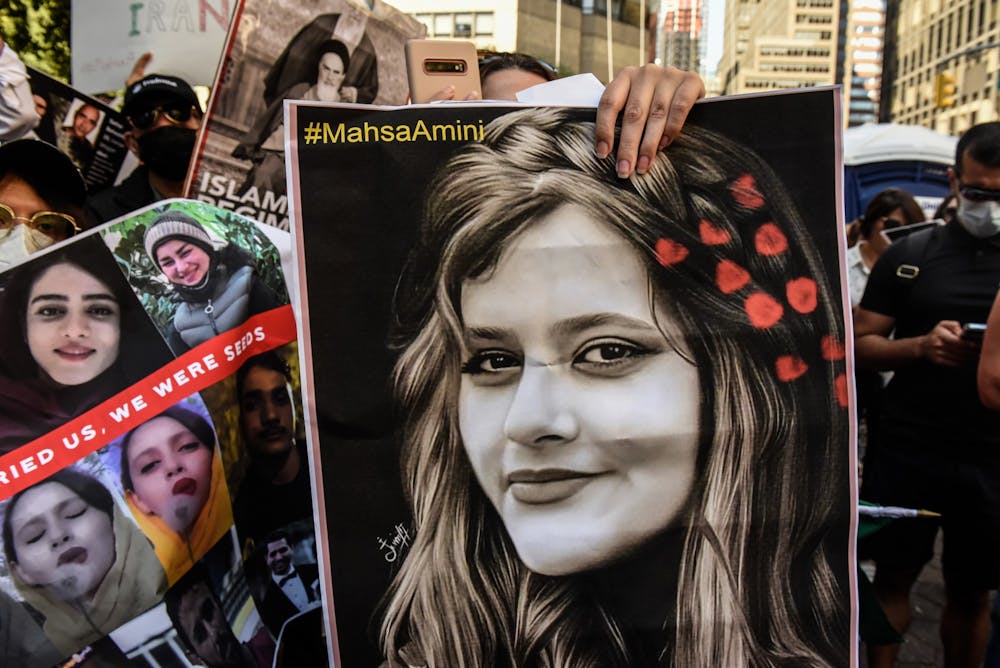Mahsa Amini, a 22-year-old Iranian woman, was detained by Iran’s morality police on Sept. 14 for allegedly violating the nation’s hijab laws, according to a press release from the U.S. Department of Treasury's Office of Foreign Assets Control.
Amini was then sent to an “educational and orientation” class at police headquarters. She was transported to a hospital in a coma and died two days later on Sept. 16, according to the press release.
Authorities claim she died of a heart attack, but eyewitnesses claim that she died due to injuries she sustained in police custody, according to the press release.
The morality police, formally known as The Guidance Patrol, have been criticized for improperly enforcing rules, violently detaining women and other human rights violations, according to an article from the New York Times.
Footage circulated on social media in September of Amini, who also goes by the Kurdish name Jina, unconscious on a hospital bed, with tubes in her mouth and nose, blood dripping from her ear, and a badly bruised face.
The images and videos of Amini along with alleged eyewitness accounts have led to conclusions the morality police are responsible for her death, according to the U.S. Treasury’s press release.
Shortly after, protests erupted in cities throughout Iran and in nations across the world. In the days closely following the protests, human rights organization Amnesty International reported that 52 known deaths had occurred at the hands of Iran’s security forces between Sept. 19 and Sept. 25, including five women and five children. Amnesty believes the death toll from that period was much higher.
Related: [Demonstrators gather for vigil for fire victims, protesting China’s zero COVID policy ]
“The Iranian authorities knowingly decided to harm or kill people who took to the streets to express their anger at decades of repression and injustice,” Agnes Callamard of Amnesty International said in a statement by the organization.
The Guardian reported the Human Rights Activists News Agency, or HRANA, said that 470 people had been killed as of Saturday, Dec. 3, including 64 minors.
“The sheer number of protesters imprisoned, killed, tortured, and maimed cannot be underestimated,” Hussein Banai, a professor of International Studies at IU, said. “This is an ongoing struggle that will likely take many different forms in the coming months and years.”
Iran’s police force, known as Law Enforcement Services, or LEF, is being sanctioned by the U.S. government for “serious human rights abuses,” according to the U.S. Treasury’s press release.
Banai said the U.S. has bargained with the Iranian regime in favor of geopolitical concerns, especially concerning Tehran's nuclear program. He contends the U.S. can no longer ignore the weight of these protests when it comes to balancing geopolitical interests.
“Human rights have been sidelined,” Banai said. “These protests inside Iran have demonstrated the utter lack of legitimacy of the regime among ordinary Iranians.”
IU student Parmida Nazarloo attended a protest in Bloomington led by the Iran Midwest Solidarity Group in November held at the Monroe County Courthouse. She said the atmosphere at the protest was supportive and encouraging, as everyone in attendance showed solidarity with the cause.
Related: [Iran Midwest Solidarity Group leads demonstration in support of Iranian Revolution ]
“There was great turnout from the Iranian community, but even more surprisingly, great participation from non-Iranian supporters,” Nazarloo said. “We listened to firsthand testimony from Iranians who experienced struggles in their country and are heartbroken with its current state.”
During protests, attendees chant, “woman, life, freedom,” a slogan that has become the figurehead for a new global movement that seeks to end the government sponsored oppression of women in Iran. The phrase originated with Kurdish female fighters and Kurdish feminist movements, according to the New York Times.
On Monday, Attorney General Mohammad Jafar Montazeri sparked confusion after responding to a question about the morality police, saying that they “have been shut down from where they were set up,” according to the BBC. Montazeri’s comments may signal the disbandment of the Guidance Patrol, though it is unclear.
Banai says that protests in Iran have been hugely significant in affecting change already.
“The power of the protests can be observed already in the degree to which women are defying the regime by taking their hijabs off, joining the protests and continuing the pressure on the regime,” Banai said.
Many protestors, including Nazarloo, are urging the collective activism occurring at global protests to translate into real changes for the Iranian regime and for women’s rights in the country.
“Iran is at a crucial tipping point where its people have mobilized and won’t stop protesting until the regime is overthrown. International support is what will end up tipping the scales,” Nazarloo said.






